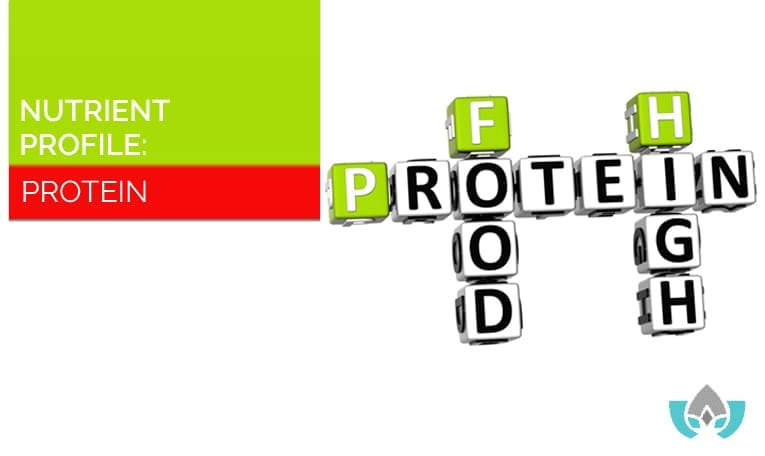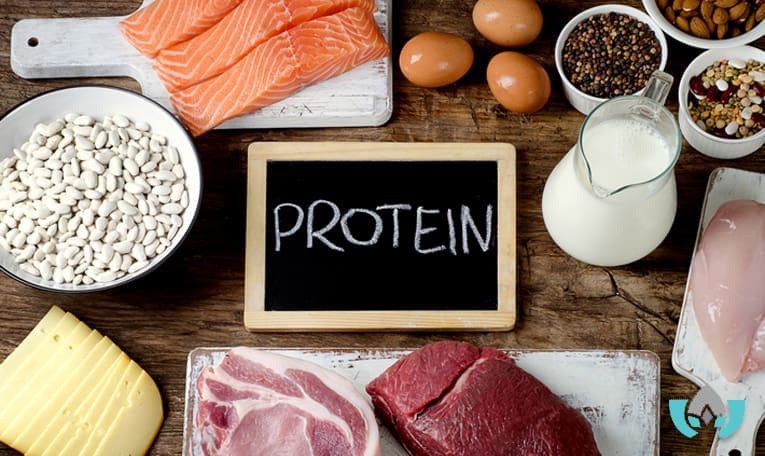
Micronutrients and macronutrients are responsible for just about every bodily function you can imagine.
All this comes through nutrition.
And the consequences if you don’t get enough nutrients can range from dry and irritated skin to loss of muscle mass and bone density.
It can certainly be overwhelming to try to understand all of the different nutrients out there, and how to know if you’re getting enough.
I’m Dr. Maria Cavallazzi, a naturopathic doctor in Mississauga, and today we’re going to help you make sense of the nutrients your body needs and what they do for you.
As a nutritional counselling naturopathic doctor, I know that proper nutrition can make an enormous difference in your overall health.
Today we’re going to take a closer look at why you need protein, and how to get it.
What Is Protein?
Broadly speaking, there are two different types of nutrients – micronutrients and macronutrients.
We’ve talked about plenty of micronutrients before on this blog – they’re vitamins and minerals.
This includes:
- Vitamin A
- Vitamin D
- Zinc
- Potassium
- Vitamin E
- Magnesium
- Vitamin B1 (and the rest of the B complex)
- Vitamin C
- And many others
On the other hand, there are three types of macronutrients – fats, carbohydrates, and the subject of this article – protein.
What Does Protein Do For The Body?
Protein does a lot.
It’s important to make sure you’re getting enough, because it affects so many different areas of your health.
Let’s look closer at some of these.
1. It Plays A Role In Biochemical Reactions In Your Body
One type of protein are enzymes, and enzymes are responsible for many of the biochemical reactions in your body.
Your body relies on enzymes for things like:
- Blood clotting
- Producing energy
- Contracting your muscles
- Digestion
Without enough protein, your body has a harder time doing all of these.
2. Your Body Uses Them To Make Hormones
Hormones are chemical messengers your body uses to control its various functions.
They’re produced in your endocrine system, which includes your thyroid, kidneys, liver, sex organs, and more.
Your body uses protein as the building blocks for some of your hormones.
Some of the hormones made up of protein include:
- Antidiuretic hormone, which tells your kidneys to reabsorb water
- Insulin, which signals the cells to take in energy
- Human growth hormone
- Glucagon, which tells your liver to breakdown glucose
3. It Regulates Your Fluid Balance
Globulin and albumin are two proteins your body uses to regulate fluid balance.
They work by attracting and retaining water, and if this balance can’t be maintained it can cause fluid build up between the cells resulting in swelling.
4. It Helps Tissue In Your Body Grow
You might associate protein with the growth of muscle tissues, but the fact is you need it for more than just bulking up.
Protein is also a key factor in your skin, nails, bones, and organs.
Your body breaks down protein in order to repair these tissues.
Certain illness and being pregnant can cause your body to use extra protein in these cases.
5. It Gives Your Cells Structure
Collagen, elastin, and keratin are proteins that help give cells structure.
The plentiful protein in your body is collagen, which is responsible for the structure of your skin, bones, tendons, and ligaments.
It also repairs skin injuries.
Elastin is what helps your tissue and organs to return to their normal shape and size after expanding and contracting.
Finally, keratin supports the health of your skin, hair, and nails.
6. Other Benefits Of Protein
We’ve only just touched the tip of the iceberg when it comes to the benefits of protein.
Other great reasons to ensure you’re getting enough of this vital nutrient include:
- Improves the health of your immune system
- Helps your body maintain pH balance in blood and other fluids
- Gives you energy
- Helps your body store and transport nutrients
- Increases your strength and muscle mass
- Improves bone health
- Relieves high blood pressure
- Keeps your appetite and hunger levels under control
- Boosts metabolism and is a natural solution for how to lose weight and keep it off

Dietary Sources Of Protein
When you think of foods high in protein, likely the first thing to come to mind is meat, fish, and eggs.
While it’s true that these are great ways to add protein to your diet, there are also a lot of excellent vegetarian and vegan options for increasing your protein intake.
If you’re looking for how to create a nutritious, environmentally friendly diet, you may be looking to reduce how much meat you eat.
Some great, non meat, ways to get your protein include:
- Nuts
- Lentils
- Beans
- Chickpeas
- Cottage cheese
- Pumpkin seeds
- Greek yogurt
- Milk
- Quinoa
Symptoms Of Protein Deficiency
If you don’t get enough protein to meet your body’s needs, you run the risk of developing a protein deficiency.
This is uncommon in North America, since protein tends to be abundant in our diets.
Protein deficiency is mostly an issue for people with poor diets, and people with certain illnesses.
Some of the results of protein deficiency include:
- Accumulation of fat in liver cells
- Decreased muscle mass
- Stunted growth
- Increased appetite, leading to obesity
- Lowered ability to fight infections
- Higher risk of bone fractures
- Problems with hair, skin, and nails
- Puffy, swollen skin
Is It Possible To Overdose On Protein?
Even though getting enough protein is a key part of your body being able to function at its peak, it’s definitely possible to get too much of a good thing.
If you eat too much protein, without fats and carbohydrates to balance it, you run the risk of developing protein poisoning, because of the strain on the kidneys and liver to metabolize it.
Symptoms of protein poisoning can include:
- Headaches
- Nausea
- Food cravings
- Hypotension (low blood pressure)
- Decreased heart rate
- Mood swings
- Chronic fatigue syndrome
- Diarrhea
Book Your Appointment With The Mindful Healing Clinic Today
Are you worried you aren’t getting enough protein?
Maybe you follow a vegetarian diet and are worried that the sources you’re including aren’t quite enough.
Or perhaps you have a gastrointestinal issue which stops you from properly absorbing nutrients.
I’m Dr. Maria Cavallazzi, a naturopathic doctor in Mississauga Ontario, and I can help.
One service I offer is nutritional counselling, which can help determine if you do have any nutritional deficiencies and find solutions to help you fill those gaps.
Book your appointment with me, Dr. Maria Cavallazzi, today.
Until next time,
Dr. Maria Cavallazzi, N.D
Mindful Healing Naturopathic Clinic
Mississauga, ON L5M 1L7
(905) 819-8200
► https://g.page/MindfulClinicNaturopathic
Dr. Maria Cavallazzi is a medical doctor from Colombia where she practiced as a family physician for 8 years until she moved to Canada 16 years ago and became a naturopathic doctor in Mississauga.


